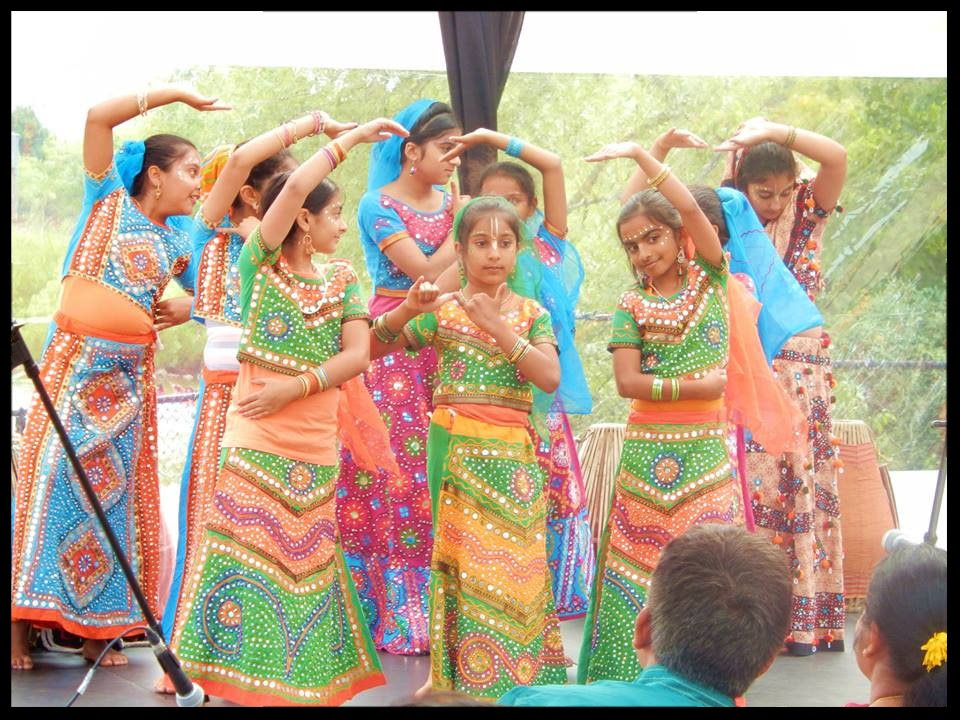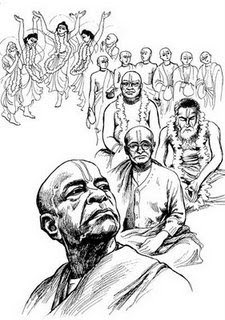 The Bhagavad-gita is also known as the Gitopanishad and is considered one of the Upanishads. The title Bhagavad-gita is sometimes translated as “The Song of God.” Gita means “song.” God, Krishna, is so sublime that whatever He speaks is music and poetry. The word bhagavan has been analyzed by Vedic authorities. Bhaga means “opulence” and is related to the word bhagya: “good fortune.” And van means “one who possesses.” So bhagavan means “He who possesses all opulence in full.”
The Bhagavad-gita is also known as the Gitopanishad and is considered one of the Upanishads. The title Bhagavad-gita is sometimes translated as “The Song of God.” Gita means “song.” God, Krishna, is so sublime that whatever He speaks is music and poetry. The word bhagavan has been analyzed by Vedic authorities. Bhaga means “opulence” and is related to the word bhagya: “good fortune.” And van means “one who possesses.” So bhagavan means “He who possesses all opulence in full.”
aisvaryasya samagrasya
viryasya yasasah sriyah
jnana-vairagyayos caiva
sannam bhaga itingana
“Full wealth, strength, fame, beauty, knowledge, and renunciation—these are the six opulences of the Supreme Personality of Godhead.” (Vishnu Purana 6.5.47)
All of us possess some wealth. I may have ten dollars, but if I look I will find someone who has a hundred dollars. And if I look further, I will find someone who has a thousand dollars, and a million, and a billion. But no one can say that he has all the wealth in all creation, that no one is equal to or greater than him in wealth. When we come to that person who has all wealth—no one is equal to or greater than him—that is Bhagavan, Krishna.
The Bhagavad-gita was originally spoken by Krishna to Arjuna. As stated in the Gita (4.1),
sri-bhagavan uvaca
imam vivasvate yogam
proktavan aham avyayam
vivasvan manave praha
manur iksvakave ’bravit
“The Personality of Godhead, Sri Krsna, said: I instructed this imperishable science of yoga to the sun-god, Vivasvan, and Vivasvan instructed it to Manu, the father of mankind, and Manu in turn instructed it to Iksvaku.” In this way, the knowledge was passed on through disciplic succession from one to the next to the next. But in the course of time, that chain became broken.
evam parampara-praptam
imam rajarsayo viduh
sa kaleneha mahata
yogo nastah parantapa
“This supreme science was thus received through the chain of disciplic succession, and the saintly kings understood it in that way. But in course of time the succession was broken, and therefore the science as it is appears to be lost.” (Gita 4.2) Nasta means “spoiled.” You may have a nice plate of prasada, but if you leave it aside and it becomes old and contaminated, it becomes nasta, spoiled. It is food, but you don’t get the benefit. To get the real benefit of the Bhagavad-gita, one must receive it through parampara (evam parampara-praptam imam rajarsayo viduh).
Five thousand years ago, Lord Krishna detected that the chain was broken and that, consequently, the knowledge was lost. So He came again and spoke the Bhagavad-gita again, to Arjuna: “Now, Arjuna, you become the first recipient of this knowledge in the new chain, so that the knowledge is received and presented as it is.” Srila Prabhupada called his translation of the Gita the Bhagavad-gita As It Is. “As it is” means as Krishna spoke it five thousand years ago and as Arjuna understood it.
How did Arjuna understand it? First, he accepted Krishna as the Supreme Personality of Godhead:
arjuna uvaca
param brahma param dhama
pavitram paramam bhavan
purusam sasvatam divyam
adi-devam ajam vibhum
“Arjuna said: You are the Supreme Personality of Godhead, the ultimate abode, the purest, the Absolute Truth. You are the eternal, transcendental, original person, the unborn, the greatest.” (Gita 10.12)
And he accepted everything that Krishna said as true: sarvam etad rtam manye yan mam vadasi kesava—“O Krsna, I totally accept as truth all that You have told me.” (Gita 10.14) “I accept whatever You say, in toto.” He did not discriminate that he liked some parts of the Gita and not other parts. Sarvam etad rtam manye: “I accept in toto everything that You have said.”
If we begin to discriminate, “I like this portion, but I don’t like that portion,” we become implicated in ardha-kukkuti-nyaya, “half-hen” logic. A farmer had a hen that was laying eggs. But the farmer thought that only the hind portion was valuable, because that part was giving eggs, but that the neck portion was simply troublesome, because it just ate food. He concluded, “I will cut the neck portion, which is just a botheration, and keep the hind portion, which gives eggs.” And when he did, of course, the hen died and there were no more eggs.
One verse in the Bhagavad-gita that is popular among some people states, karmany evadhikaras te: “You are entitled to do your duty.” They think, “I can do my duty. I can go to work. I can make and spend money. I can take care of my family, live with my family, enjoy with my family and friends. That is a precious instruction.” But when they come to sarva-dharman parityajya mam ekam saranam vraja—give up all varieties of religiousness and surrender to Krishna—that is a little troublesome, and they want to cut that part: “We don’t really need it. We’ll just keep the really valuable part: I can do my duty.”
In order to get the full benefit of the Bhagavad-gita, it is essential to accept it as it is. Devotees who have accepted it as it is and applied its principles in their lives have undergone extraordinary transformations. This knowledge can really help people. And any genuine person who gets something good will naturally want to share it with others. Anyone who has imbibed the nectar of the Bhagavad-gita, gotten the benefit of the Bhagavad-gita, will want to share the knowledge with others. It is natural. If you are eating a nice plate of prasada and taste something really good, it is natural to say, “You should try this; it’s really good.” Anyone—any child—will do that. So, when you actually experience the benefit of the Bhagavad-gita in your life, you will naturally want to share the knowledge with others so that they too can benefit and become happy.
Now, why did Krishna choose Arjuna to be the first student of the Bhagavad-gita? Arjuna was not a sannyasi. He was a married man. And he was not a brahman. He was a warrior. Why Arjuna? Krishna explains,
sa evayam maya te ’dya
yogah proktah puratanah
bhakto ’si me sakha ceti
rahasyam hy etad uttamam
“That very ancient science of the relationship with the Supreme is today told by Me to you because you are My devotee as well as My friend and can therefore understand the transcendental mystery of this science.” (Gita 4.3) The main qualification for understanding the Gita is bhakto ’si me, to be Lord Krishna’s devotee. And later Krishna says that one should hear the Gita with faith and without envy (sraddhavan anasuyas ca srnuyad api yo narah). (Gita 18.71) This is a crucial point: to get the true benefit of the Gita, one must be a devotee.
What does it mean to be a devotee? Sometimes the word devotee is used quite broadly. To begin, let us understand devotee in contrast to karmi, jnani, and yogi. These are all technical (as well as general) terms. A karmi engages in fruitive work. He works for personal gain: “I have worked and earned. Now I have the right to enjoy the fruit.” That is 90 percent of the world. People work, and they feel, “I have earned the money, so I have the right to spend it—on myself, on my family, on my community, on my country” (or whatever limited or extended concept of sense gratification they have). But the Gita says no. Karmany evadhikaras te ma phalesu kadacana: “You have a right to perform your prescribed duty, but you are not entitled to the fruits of action.” (Gita 2.47) The fruits belong to Krishna.
If you invite a carpenter to your house and give him wood and nails and glue—everything he needs—and say, “I want you to build me a cabinet,” in the end, to whom does the cabinet belong—to the carpenter or to you? It belongs to the proprietor, not the worker. The worker has assembled the ingredients supplied by the proprietor, but that doesn’t make him the owner.
This entire material creation, this entire cosmic manifestation—the elements are provided by Krishna. The earth we tread; the water we drink; the air we breathe; the fire, or electricity, we use—everything belongs to Him, and we cannot rightly claim any of it for ourselves. We may assemble the elements in different ways, but it all belongs to Krishna and is meant to be used for His purposes.
A karmi engages in work and wants to keep the fruits for himself. A karma-yogi engages in work but gives the fruits to Krishna. A man may grow a tree that produces fruits. A karmi will keep the fruits for himself, whereas a karma-yogi will give the fruits, or some of the fruits, to Krishna. The sakama-karma-yogi has selfish desires, but he still gives something to Krishna. If the tree produces a hundred mangoes, he may give one or two or ten or twenty to Krishna. And as he becomes purified, as he develops more faith and becomes more attached to Krishna, he will give more to Krishna. Eventually he may give all one hundred mangoes to Krishna, without any selfish desire (niskama-karma-yoga). But he will not be the loser. Krishna will give him His prasada, His mercy.
The jnanis and often the yogis are impersonalists; they believe that God is ultimately impersonal—nameless, formless, without qualities, without activities. They may even go so far as to think that Krishna’s form is material, that just as we have a physical body made of flesh and bones and blood, so does Krishna. And according to them, if Krishna is material, then His name, form, qualities, and activities are also all material. People may chant His name, but ultimately they have to go beyond that. People may worship His form, but they have to go beyond that. People may talk about His qualities and activities, but they have to go beyond that. Ultimately, according to them, we have to go beyond all these illusory forms and names and come to the all-pervading impersonal light and merge and become one with it. Then there is no you, no me, no Krishna—nothing. Just oneness.
In theory, that is also a possibility. But it is very rare to achieve that state, and very difficult. Lord Krishna explains in the Bhagavad-gita (12.2–7):
mayy avesya mano ye mam
nitya-yukta upasate
sraddhaya parayopetas
te me yuktatama matah
“Those who fix their minds on My personal form and are always engaged in worshiping Me with great and transcendental faith are considered by Me to be most perfect.
ye tv aksaram anirdesyam
avyaktam paryupasate
sarvatra-gam acintyam ca
kuta-stham acalam dhruvam
sanniyamyendriya-gramam
sarvatra sama-buddhayah
te prapnuvanti mam eva
sarva-bhuta-hite ratah
“But those who fully worship the unmanifested, that which lies beyond the perception of the senses, the all-pervading, inconceivable, unchanging, fixed and immovable—the impersonal conception of the Absolute Truth—by controlling the various senses and being equally disposed to everyone, such persons, engaged in the welfare of all, at last achieve Me.
kleso ’dhikataras tesam
avyaktasakta-cetasam
avyakta hi gatir duhkham
dehavadbhir avapyate
“For those whose minds are attached to the unmanifested, impersonal feature of the Supreme, advancement is very troublesome. To make progress in that discipline is always difficult for those who are embodied.
ye tu sarvani karmani
mayi sannyasya mat-parah
ananyenaiva yogena
mam dhyayanta upasate
tesam aham samuddharta
mrtyu-samsara-sagarat
bhavami na cirat partha
mayy avesita-cetasam
“But those who worship Me, giving up all their activities unto Me and being devoted to Me without deviation, engaged in devotional service and always meditating upon Me, having fixed their minds upon Me, O son of Prtha—for them I am the swift deliverer from the ocean of birth and death.”
Not only is the impersonal path difficult, but the result is not very satisfying, because ultimately everyone wants happiness and love. The two most basic human needs are to love and to be loved. We want friends, we want family, and we want community; we are not happy without them. If you were a billionaire but could never see another living being, would you be happy? No. You would be so desperate for company, for relationship, that you would say, “I don’t want this wealth. I just want to be with people I love and who love me.” In a way, this was Arjuna’s thinking at the beginning of the Bhagavad-gita. He considered, “What is the use of winning a kingdom if in the course of the battle all my friends and family die? What’s the use? With whom will I enjoy my kingdom?” The thought of being without family and friends so overwhelmed Arjuna that he said to Krishna,
na hi prapasyami mamapanudyad
yac chokam ucchosanam indriyanam
avapya bhumav asapatnam rddham
rajyam suranam api cadhipatyam
“I can find no means to drive away this grief which is drying up my senses. I will not be able to dispel it even if I win a prosperous, unrivaled kingdom on earth with sovereignty like that of the demigods in heaven.” (Gita 2.8)
There is much truth to what Arjuna said at the beginning of the Gita, but that truth is on a lower level. And by the mercy of Lord Krishna, after hearing the Bhagavad-gita, Arjuna was elevated to a higher, better understanding. He came to realize that perfect happiness and love are to be realized in relation to Krishna, and so Arjuna surrendered unto Him.
Krishna gave Arjuna the choice. Krishna did not force him, because true surrender, or true love, must be voluntary. He gave Arjuna the freedom to deliberate and then decide:
iti te jnanam akhyatam
guhyad guhyataram maya
vimrsyaitad asesena
yathecchasi tatha kuru
“Thus I have explained to you knowledge still more confidential. Deliberate on this fully, and then do what you wish to do.” (Gita 18.63) Yathecchasi tatha kuru—“You can do whatever you like.” We all have free will, given to us by God. But after hearing the Bhagavad-gita, Arjuna immediately responded, karisye vacanam tava: “I will do whatever You say.” That is the position of the surrendered devotee.
arjuna uvaca
nasto mohah smrtir labdha
tvat-prasadan mayacyuta
sthito ’smi gata-sandehah
karisye vacanam tava
“Arjuna said: My dear Krsna, O infallible one, my illusion is now gone. I have regained my memory by Your mercy. I am now firm and free from doubt and am prepared to act according to Your instructions.” (Gita 18.73)
Now, we may be a little worried. We are back to that troublesome sloka, sarva-dharman parityajya mam ekam saranam vraja: “Abandon all varieties of religion and just surrender unto Me.” And we may wonder, “What are the implications of karisye vacanam tava: ‘I am prepared to act according to Your instructions’? What if Krishna tells me to give up my wife, my children, my business, my home? Then what?” This is a problematic question, and some people may not want to pursue the course of surrender to Krishna, because they are afraid of the consequences.
But there is some leniency here, some considerateness. Lord Krishna gives us a gradual process to come to the stage of surrender, because surrender is based on faith. When we have faith in someone or something, we can surrender. If we don’t have faith, we won’t surrender. In this present Age of Kali, genuine faith is rare; it is very difficult to come by. Society is materialistic, and everyone is acculturated in the idea that they are independent, free to think and do whatever they like, without restriction. In fact, they are envious. Material life means envy—first of Krishna. People think, “Why should I surrender to Him? I am also intelligent. I also know things. I can also speak and argue. Why should I surrender?” And people find fault with Krishna: “Why did He tell Arjuna to fight? Why did He cause so many people to die?” In particular, people who are envious find fault with Krishna. They can never understand the Bhagavad-gita. Therefore Lord Krishna says,
idam te natapaskaya
nabhaktaya kadacana
na casusrusave vacyam
na ca mam yo ’bhyasuyati
“This confidential knowledge may never be explained to those who are not austere, or devoted, or engaged in devotional service, nor to one who is envious of Me.” (Gita 18.67) One must be a devotee, a bhakta. Only devotees are without envy.
Still, Krishna, like a loving father, wants to bring all His sons and daughters to the highest perfection, even though He knows that it may take some time. A parent will want his child to grow to be strong and healthy and happy and intelligent and competent, and to take over the family business. A genuine, loving parent will want to give everything to the child, but the parent first wants to see that the child is responsible enough.
As I grew up, my father gave me a weekly allowance. My first allowance was five or ten cents. I was just a child, and he wasn’t sure how I would use the money. Eventually he raised my allowance to twenty-five cents. And I felt so proud: “My father really trusts me.”
Parents want to give to their children, but they also want to see that their children are responsible enough to take care of what they give them. In a similar way, Krishna wants to give us everything—even Himself—but He wants to see that we are qualified.
Another analogy is a teacher in a classroom. The study of math begins with one plus one equals two. There is much more, but the students proceed step by step: addition, then subtraction, then multiplication, then division—so many processes they have to learn.
In the Bhagavad-gita, the first instruction is that you are not the body but the soul within the body. Aham brahmasmi. That is the beginning, and if we understand even one line of the Bhagavad-gita, from the very beginning, our lives will change.
dehino ’smin yatha dehe
kaumaram yauvanam jara
tatha dehantara-praptir
dhiras tatra na muhyati
“As the embodied soul continuously passes, in this body, from boyhood to youth to old age, the soul similarly passes into another body at death. A sober person is not bewildered by such a change.” (Gita 2.13) If we just understand that we are not the body but are the atma, the jivatma, within the body, that alone is enough to change our whole life. We will no longer act on the basis of the body, for sense gratification, but on the basis of the soul, for self-realization. In today’s materialistic society, one’s whole endeavor is to get things for the body—my body, my wife’s body, my children’s bodies, my parents’ bodies—to make the body comfortable. But the body is just dress for the soul. And which is more important—the clothes or the person wearing the clothes? The person, of course. The body itself is just dress, which changes. The real person is the soul, who exists always.
vasamsi jirnani yatha vihaya
navani grhnati naro ’parani
tatha sarirani vihaya jirnany
anyani samyati navani dehi
“As a person puts on new garments, giving up old ones, the soul similarly accepts new material bodies, giving up the old and useless ones.” (Gita 2.22)
If we understand just this one point, we will work for the benefit of the soul, which is our actual self and is part and parcel of the Supreme Self, God, Krishna, knowing that our real relationship is with Him. And then, gradually, step by step, we will come to the conclusion of the Bhagavad-gita:
man-mana bhava mad-bhakto
mad-yaji mam namaskuru
mam evaisyasi satyam te
pratijane priyo ’si me
“Always think of Me, become My devotee, worship Me, and offer your homage unto Me. Thus you will come to Me without fail. I promise you this because you are My very dear friend.” (Gita 18.65)
sarva-dharman parityajya
mam ekam saranam vraja
aham tvam sarva-papebhyo
moksayisyami ma sucah
“Abandon all varieties of religion and just surrender unto Me. I shall deliver you from all sinful reactions. Do not fear.” (Gita 18.66)
Man-mana—always think of Krishna. If you do that, you will naturally become His devotee (mad-bhakto). You will worship Him (mad-yaji) and offer obeisance unto Him (mam namaskuru). It is so simple.
The critical point is man-mana, to always think of Krishna. And how can we always think of Him? In the ninth chapter of the Gita Krishna says,
satatam kirtayanto mam
yatantas ca drdha-vratah
namasyantas ca mam bhaktya
nitya-yukta upasate
“Always chanting My glories, endeavoring with great determination, bowing down before Me, these great souls perpetually worship Me with devotion.” (Gita 9.14) Satatam kirtayanto mam—if we always (satatam) engage in glorifying Krishna, chanting His holy name (kirtana), we will always think of Him.
We are Hare Krishna devotees, and we are speaking about the Bhagavad-gita. What is the connection? The chanting of Hare Krishna is the real way to follow the instructions of Lord Krishna in the Bhagavad-gita. Sri Krishna Chaitanya, the incarnation of Krishna for the present Age of Kali, who inaugurated the Hare Krishna movement five hundred years ago, taught, kirtaniyah sada harih: “Always chant the holy name of Hari [Krishna].” And in the Bhagavad-gita, Sri Krishna gives the same instruction: satatam kirtayanto mam—always engage in kirtan, chanting the holy name of Krishna. The chanting of Hare Krishna is really the fulfillment of Lord Krishna’s ultimate instruction in the Bhagavad-gita: man-mana—always think of Krishna. Chanting is the best—and easiest—way to think of Krishna.
Of course, we think of Krishna when we hear about Him from the Bhagavad-gita and Srimad-Bhagavatam, but for that we need a book or a reader. We think of Krishna when we see His Deity form, His murti, but for that we need a temple, a mandir, with a murti. There are so many ways of thinking of Krishna, but the beauty of chanting, either kirtan or japa, is that we need only our tongue and ears. In the Bhagavad-gita (10.25) Lord Krishna recommends, yajnanam japa-yajno ’smi: “Of sacrifices I am the chanting of the holy names [japa].” This, anyone can do. Young or old, black or white, man or woman, educated or uneducated—anyone and everyone can chant Hare Krishna and fulfill Krishna’s instruction in the Bhagavad-gita.
Sri Caitanya-caritamrta, the authorized biography of Sri Chaitanya Mahaprabhu, relates an instructive story. While touring South India, Sri Chaitanya Mahaprabhu came to the holy place of Sri Ranga-ksetra, where, in front of the temple, He saw a brahman holding the Bhagavad-gita and crying, surrounded by people who were laughing and criticizing him. Sri Chaitanya asked the brahman, “Why are these people laughing?” And the brahman replied, “I am holding the Bhagavad-gita, but I am more or less illiterate. I don’t know how to pronounce the words properly, and I do not know what they mean. But my guru ordered me to read it, and so I read all eighteen chapters every day.” Chaitanya Mahaprabhu inquired, “Why are you crying?” And the brahman replied, “When I hold the Bhagavad-gita I see before me Krishna and Arjuna on the chariot. Krishna is acting as Arjuna’s chariot driver. Taking the reins in His hands, He appears very beautiful. While seeing Lord Krishna instructing Arjuna, I weep in ecstatic happiness.” Then Lord Chaitanya told the brahman, “You are the true authority in the reading of the Bhagavad-gita. You know the real purport of the Bhagavad-gita.” And He embraced him.
Proud people may think, “Oh, these Hare Krishna people can’t understand much. They don’t know Sanskrit. They don’t have the samskaras. Let them chant. It is good.” But actually, by chanting the holy name of Krishna one awakens one’s love for Him, which is the real purport of the Bhagavad-gita. By chanting, one fulfills the Lord’s instructions in the Bhagavad-gita to always think of Him and sing His glories. Although some who chant may not be very learned or knowledgeable in a certain sense, if they are genuine devotees of Krishna, they are fulfilling the Gita’s real purport.
aho bata sva-paco ’to gariyan
yaj-jihvagre vartate nama tubhyam
tepus tapas te juhuvuh sasnur arya
brahmanucur nama grnanti ye te
“Oh, how glorious are they whose tongues are chanting Your holy name! Even if born in the families of dog-eaters, such persons are worshipable. Persons who chant the holy name of Your Lordship must have executed all kinds of austerities and fire sacrifices and achieved all the good manners of the Aryans. To be chanting the holy name of Your Lordship, they must have bathed at holy places of pilgrimage, studied the Vedas, and fulfilled everything required.” (SB 3.33.7)
The International Society for Krishna Consciousness not only presents the knowledge of the Bhagavad-gita but also gives the practical means by which one can fulfill its purport—to become a devotee of Krishna, always think of Him, worship Him, offer homage to Him, and preach His message. After personally surrendering to Krishna (sarva-dharman parityajya mam ekam saranam vraja), one can go further and teach this knowledge. This is Lord Krishna’s last instruction:
ya idam paramam guhyam
mad-bhaktesv abhidhasyati
bhaktim mayi param krtva
mam evaisyaty asamsayah
“For one who explains this supreme secret to the devotees, pure devotional service is guaranteed, and at the end he will come back to Me.
na ca tasman manusyesu
kascin me priya-krttamah
bhavita na ca me tasmad
anyah priyataro bhuvi
“There is no servant in this world more dear to Me than he, nor will there ever be one more dear.” (Gita 18.68–69) The real conclusion of the Bhagavad-gita, built upon one’s full surrender to Krishna, is to spread this message and become most dear to Krishna.
This is the opportunity we all have. On Gita Jayanti we think of Krishna, recite the Gita, and perform the yajna, but the real essence of the celebration is to bring more people to Krishna, to the wisdom of the Gita. As devotees, we want to bring others to Krishna, and when we do, Krishna is even more pleased. And that is what Gita Jayanti is really meant to do: to please Krishna, to bring the Bhagavad-gita to more people and bring more people to Krishna—and make us dear to Krishna.
It is a wonderful opportunity. I have been chanting Hare Krishna and reading the Bhagavad-gita for forty years, and it is ever-fresh. Once, Srila Prabhupada told a New York Times interviewer, “Every day your employer is printing so many newspapers. On Sunday especially the paper is so big that one can hardly carry it. But after reading it for an hour, people throw it away. Here is this book—the Bhagavad-gita—and people keep it and read it for a lifetime, and in this way it has been read for the past five thousand years. Give people such literature that will be taken and kept forever.” And the reporter laughed—and agreed.
I am very grateful to all of you for having come this evening, after what was probably a long, hard day at work. I am grateful that you came and spared your valuable time. And I look forward to working together with all of you on this project, which will be so beneficial to so many people. Srila Prabhupada’s guru instructed him to preach the message of the Bhagavad-gita in English all over the world, telling him, “This will do much good for you as well as for your audience.” So, it is win-win-win. It will be beneficial for you, it will be beneficial for the people in general, and ultimately Krishna will be pleased. And that is our goal—that is what bhakti means—to please Krishna. When Krishna is pleased, our life is successful and we are naturally pleased and satisfied.
Thank you very much.
Hare Krishna.
[An address by Giriraj Swami to leaders of Hindu organizations in Houston, October 23, 2009.]

 By Kripamoya Dasa
By Kripamoya Dasa By Satyaraja Dasa
By Satyaraja Dasa  By Chaitanya Charana Dasa
By Chaitanya Charana Dasa

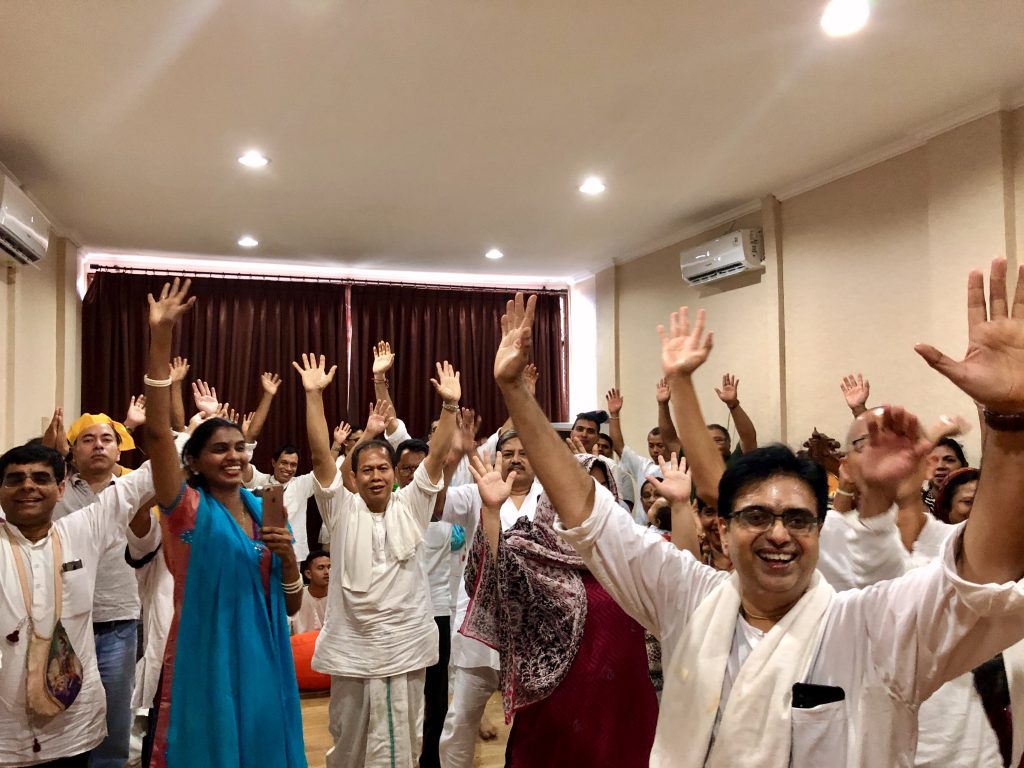
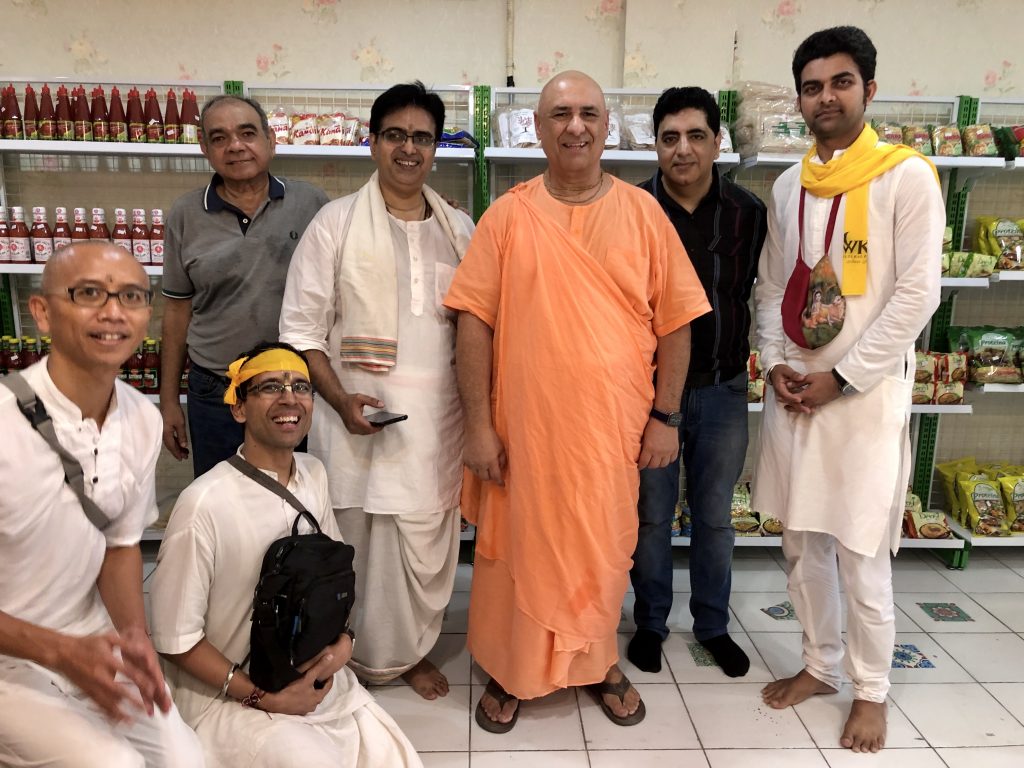





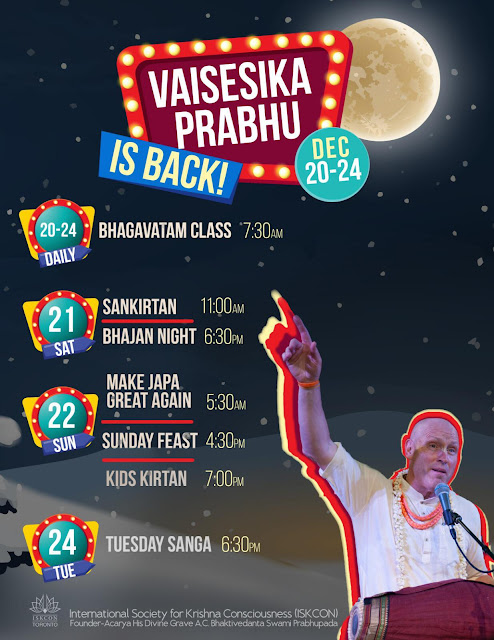














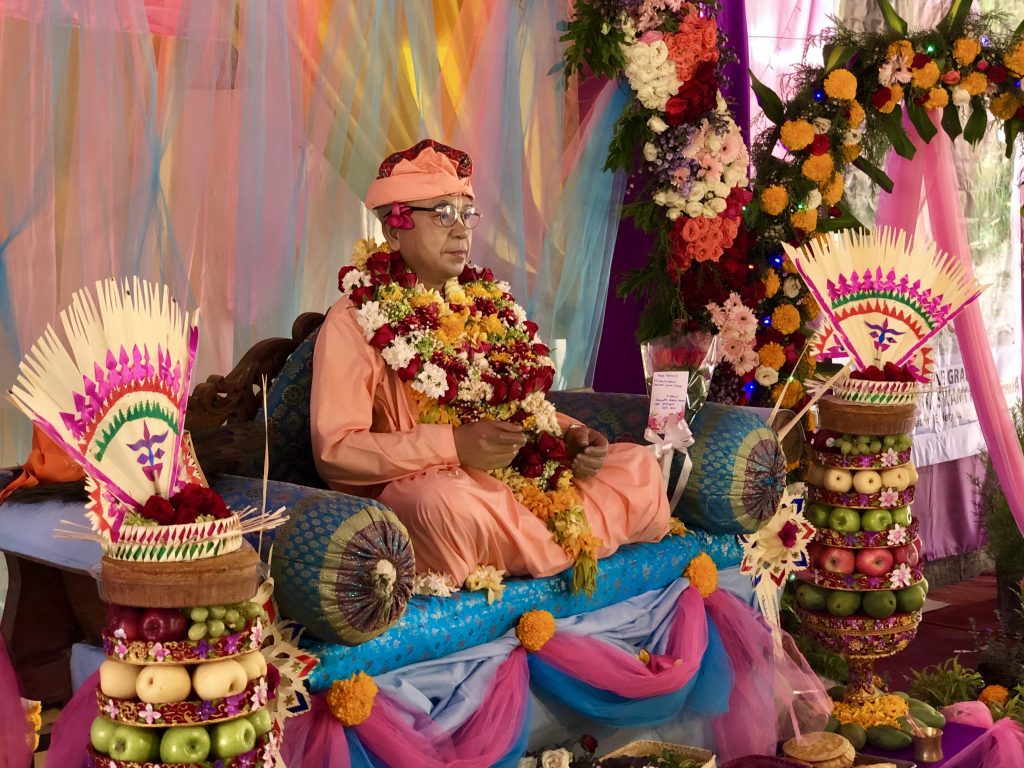
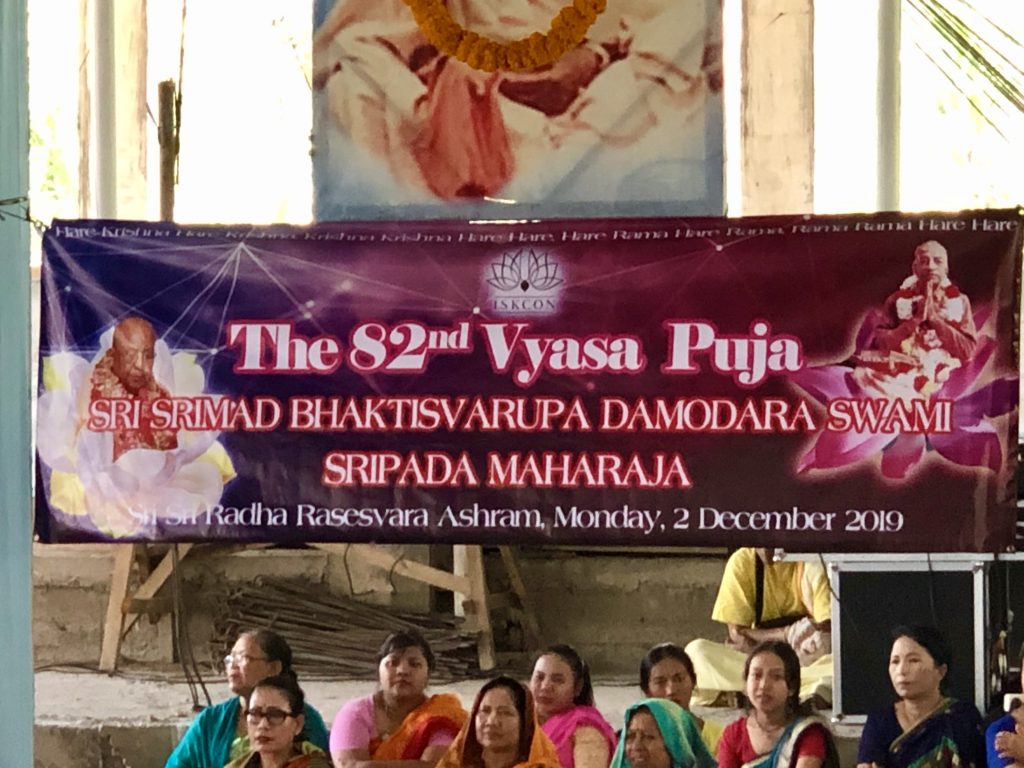
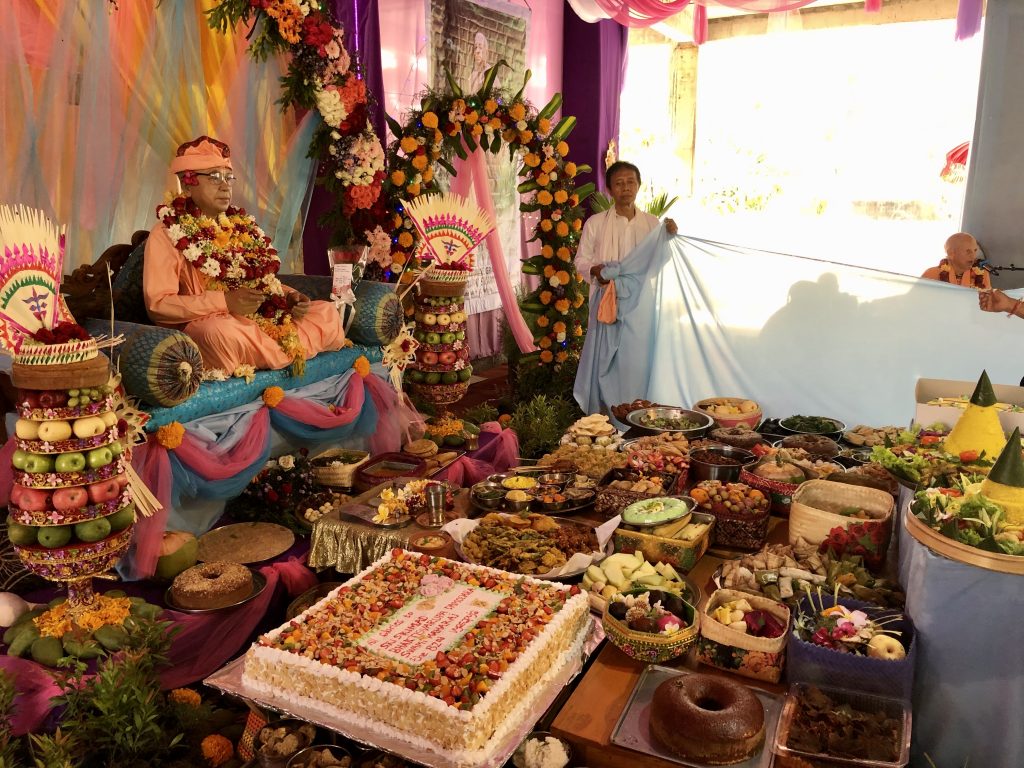
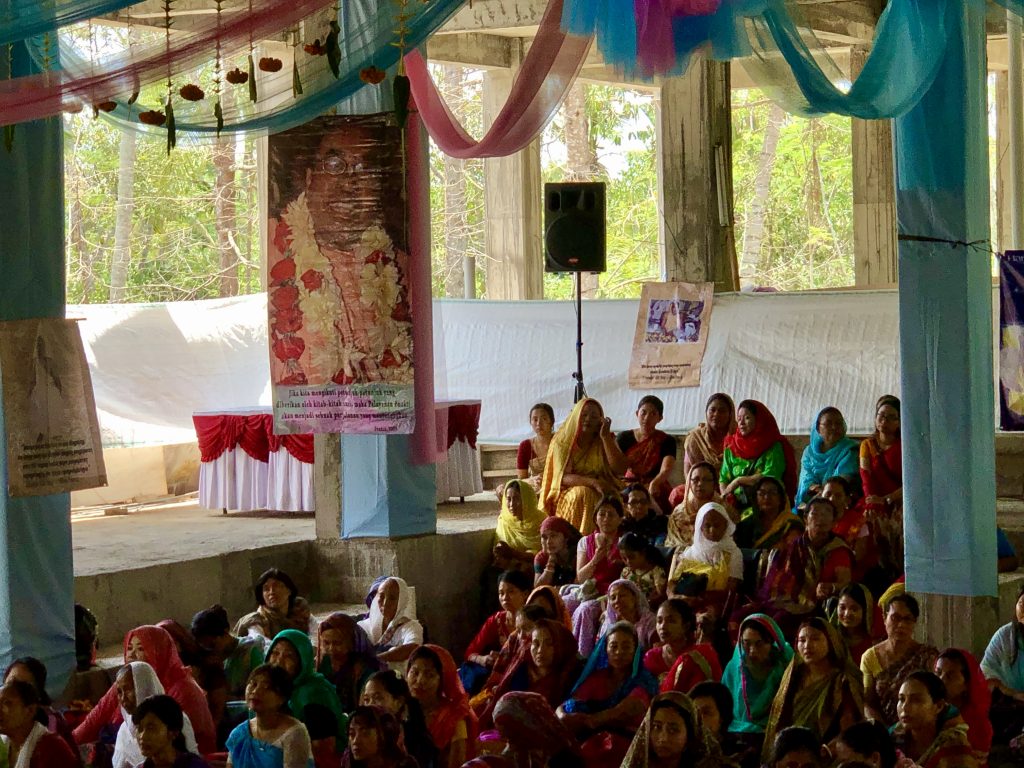
















 Saphala Ekadasi
Saphala Ekadasi